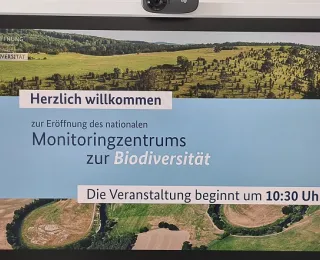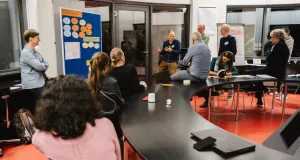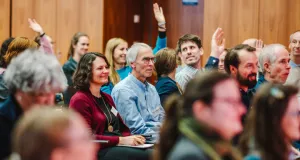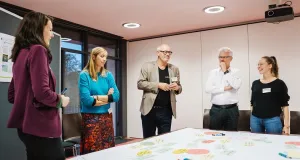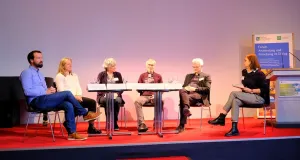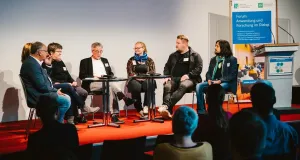Milestones

Overall concept for nationwide biodiversity monitoring
An overarching task of the Monitoring Centre is the development of an overall concept for nationwide biodiversity monitoring. Various specialist teams and committees of the Monitoring Centre are working on the development of the overall concept.
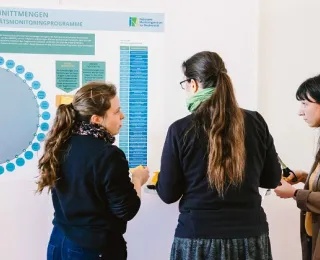
Development steps
The following milestones have been reached:
In Leipzig, experts from research, administration and practice came together to discuss the further development of nationwide biodiversity monitoring. The forum focused on discussing and refining priority objectives for nationwide biodiversity monitoring, which are to be jointly implemented over the coming years.
On 31 July 2024, the Monitoring Centre, in collaboration with its committees, established the objectives for the nationwide biodiversity monitoring programme. These objectives were based on the outcomes of the expert conference held from 28 February to 1 March 2023. In close coordination with the committees, the Centre is now developing a concept for the implementation of these established goals.
Participants from federal and state ministries, specialised authorities and other experts worked out guidelines for the goals that nationwide biodiversity monitoring should fulfil.
A state analysis of existing nationwide biodiversity monitoring programmes was carried out as a basis for the overall concept.
October 2022 - Establishment of the "Marine Monitoring" working group + The nationwide biodiversity monitoring shall cover both the terrestrial and marine areas as well as inland waters. In order to devote more attention to the marine area, an internal working group on marine monitoring is being set up at the Monitoring Centre's head office. This will be integrated into the Federal/State Working Group North Sea and Baltic Sea (BLANO). Here, the Monitoring Centre is also a member of the cross-sectional working groups "Data" and an extended member of the cross-sectional working group "Recording and Assessment (ErBe)".
A central task of the principle expert committee is to support the development of the overall concept for the nationwide biodiversity monitoring. For this reason, no separate expert committee will be set up to develop the overall concept for the nationwide biodiversity monitoring. In addition, the expert committees on soil biodiversity and influencing variables contribute essential building blocks.
The preliminary concept for nationwide biodiversity monitoring is developed and adopted by the principle expert committee. It presents the cornerstones and the process of further concept development.
Committees and technical work
Collaboration in committes with experts from a wide range of disciplines forms the foundation of the Monitoring’s Centre work at the national level.
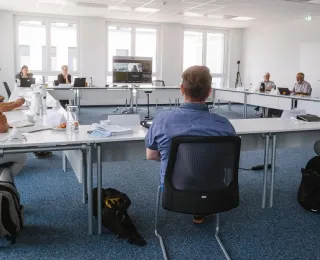
Collaboration with the expert committee on soil biodiversity
The expert committee "Monitoring of soil biodiversity and its functions" advises the head office and the principle expert committee of the Monitoring Centre on the its thematic focus. It develops a concept for nationwide soil biodiversity monitoring.
With the design of this monitoring module, the expert committee has created an important component for the first comprehensive survey of soil biodiversity in Germany. The module defines which organism groups are to be monitored, which biological parameter will be collected, which methods are suitable for this purpose, and how samples should be archived. In addition, it specifies which supplementary monitoring data – such as environmental data – will be collected to enable better comparison and evaluation of soil communities in future. In 2026, the monitoring module will be incorporated into an already technically coordinated basic concept for a nationwide soil biodiversity monitoring scheme.
With its new thematic page “Indicators of Soil Biodiversity”, the Monitoring Centre highlights the hidden diversity within soils. The page presents current approaches and initiatives for developing indicators that capture the state and dynamics of soil life – from earthworms as key organisms to further planned indicator groups.
Based on a recent survey, the Monitoring Centre has compiled a survey of experts on soil biodiversity. The collection shows who in Germany has expertise in assessing and identifying soil biological diversity – across research institutions, public authorities, companies and other organisations.
The nationwide baseline survey of soil biodiversity aims, for the first time, to comprehensively assess the diversity of life within Germany’s soils. To establish a solid foundation for the long-term monitoring and protection of soil and biodiversity, the expert committee has developed a series of recommendations. These include guidelines for selecting suitable groups of soil organisms and establishing sampling criteria to ensure representative and reliable results.
The expert committee publishes the article “Pathways to a Harmonised Nationwide Monitoring Scheme: Improving the Assessment of Soil Biodiversity and Its Functions.” The article explains why soil organisms are indispensable for key ecosystem functions – and highlights the considerable knowledge gaps that still exist regarding soil biodiversity in Germany. It summarises the challenges of current monitoring efforts and outlines how, since 2021, the expert committee has been developing guidelines for a harmonised, nationwide soil biodiversity monitoring scheme. This process involves identifying key areas for action and jointly prioritising objectives together with the monitoring community.
The Biodiversa+ pilot project "Soil biodiversity in protected, near-natural forests" collects comprehensive data on site characteristics, soil properties and vegetation in near-natural forests across a wide range of biogeographical regions in Europe. On behalf of the Monitoring Centre, six forest sites in Germany are currently being investigated in terms of soil biology (macro-, meso- and microfauna) using the SoilBON protocol.
Soil biology surveys at federal state level were compiled in consultation with the federal state authorities. In addition to ongoing monitoring activities, completed and planned programmes are also included.
The project "Recording soil organisms and their functions in a nationwide biodiversity monitoring programme: state of knowledge and practicability" has been successfully completed. The result is a up to up-to-date information basis about the informative value and practical requirements of recording soil organism groups and their functions. The expert committee uses this information to develop monitoring modules. The modules focus on organism groups and soil biodiversity functions with high information value and practicable recording.
The symposium "Ways for a nationwide soil biodiversity monitoring" takes place in Leipzig on 5 and 6 June 2023. Participants discuss the objectives and requirements of nationwide soil biodiversity monitoring and contribute their own monitoring approaches and results.
The key issues paper on the further development of nationwide soil biodiversity monitoring is published. It focuses on the importance of soil, soil biodiversity and the need for monitoring. It provides an overview of nationwide programmes.
The expert committee on soil biodiversity starts its work in September 2021. Monitoring programmes related to soil biodiversity at federal and state level, definition of soil biodiversity as well as goals and requirements for a nationwide soil biodiversity monitoring are being developed.
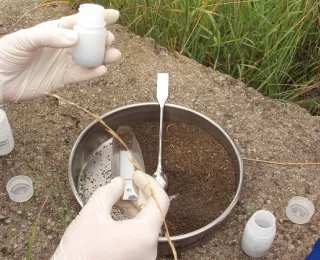
Collaboration with the expert committee on drivers
The expert committee "Improving the availability of data on drivers of biodiversity" advises the head office and the policy expert panel. It develops a concept on the thematic focus of influencing variables on biodiversity as part of the overall concept "Advancement of a nationwide biodiversity monitoring".
New factsheets from the Monitoring Centre provide, for the first time, a structured overview of programmes across Germany that record drivers influencing biodiversity – from climate change and land use to pollutant inputs. The overview promotes transparency, facilitates access to data, and strengthens understanding of the causes behind changes in biological diversity.
A workshop held by the expert committee on influencing factors, on 25-26 June 2024, focused on how land use and land use intensity can be captured in biodiversity monitoring. Experts from federal research institutions, universities, state authorities, and professional associations discussed the current state of data, methodologies, and challenges on topics such as management practices, pesticides, and nitrogen. The results will be incorporated into a position paper aimed at improving the data basis for factors affecting biodiversity. This paper will serve as a foundation for the comprehensive concept of nationwide biodiversity monitoring currently being developed by the Monitoring Centre.
The externally conducted research of recording and monitoring programmes of variables influencing biodiversity in Germany has been completed. Based on this, the head office is conducting an state analysis and identifying gaps in the availability of data on influencing variables.
A key issues paper with essential contents and tasks of the expert committee for the advancement of the nationwide biodiversity monitoring in the area of drivers of biodiversity is published.
In October 2021, the expert committee on drivers meets for the first time and determines the main objectives of its work. These goals include the development of a concept for the systematisation and prioritisation of drivers. In addition, shortcomings in the availability of data on these variables are to be identified. For this purpose, a detailed as-is analysis of the national collection and monitoring programmes for influencing variables will be carried out.
Co-financing of monitoring programmes and project funding
One of the Monitoring Centre’s tasks is the co-financing of new monitoring programmes implemented by the federal states. In addition, the Centre supports projects that specifically advance nationwide biodiversity monitoring – for example, through new methods, digital solutions, or by strengthening voluntary work and citizen science. The first projects started in 2024.
Development steps
The following milestones have been reached:
The funding call “Future-Oriented Biodiversity Monitoring” supports projects that specifically advance nationwide biodiversity monitoring – for example, through new methods, digital solutions, or by strengthening voluntary work and citizen science. A total of 59 project outlines were submitted.
Baden-Württemberg, Rhineland-Palatinate, Saarland, Schleswig-Holstein and Thuringia have now signed the administrative agreement and will begin practical implementation of ecosystem monitoring from 2026 onwards. Five further federal states have expressed their interest and are planning to join and start ecosystem monitoring at a later stage. With the launch of ecosystem monitoring, an important knowledge gap on the status and development of habitats across the wider landscape will be closed.
On 25 March 2025, the first kick-off meeting of projects funded by the Monitoring Centre took place in Leipzig. The funded projects serve as exemplary initiatives – Flora Incognita, the Second Atlas of German Breeding Birds (ADEBAR 2), the expansion of the Butterfly Monitoring Scheme (FAMos), and the Monitoring of Small Watercourses (FLOW).
Together, they exemplify the collaboration of science, public authorities and volunteers. Their shared goal: to close data gaps through robust datasets and to strengthen public awareness of biodiversity.
On 23 August 2024, the administrative agreement between the federal and state governments for the joint financing and implementation of nationwide ecosystem monitoring (Administrative Agreement on Ecosystem Monitoring) was officially adopted. The agreement has been submitted to all federal states and, as of November 2024, the first four federal states have already signed it.
Voluntary work and citizen science
We are committed to strengthening voluntary engagement and citizen science initiatives in biodiversity monitoring and to integrating them more effectively into the nationwide monitoring system. Together with scientific societies, associations and research institutions, we promote networking, exchange and visibility among those involved. Another key focus is the promotion of species identification skills.
Development steps
The following milestones have been reached:
Since April 2025, the National Monitoring Centre for Biodiversity in Germany has been a member of the working group “Monitoring Biodiversity using Citizen Science” within the European Citizen Science Association (ECSA). The group aims to connect stakeholders from science, society, and practice to promote innovative approaches to biodiversity monitoring that actively involve engaged members of the public. By sharing proven methods such as BioBlitz events, it seeks to create synergies and strengthen the integration of citizen science into research and policy.
The Museum für Naturkunde Berlin and the Monitoring Centre discussed with experts how to better integrate citizen science data into biodiversity monitoring.
Together with our partners from observation.org/LWL Museum of Natural History, ornitho.de/DDA, the Thünen Institute, the Julius Kühn Institute, the Helmholtz Centre for Environmental Research (UFZ) and the Federal Office for Agriculture and Food (BLE), the Monitoring Centre took part in the Week of the Environment 2024. The activities and exhibits demonstrated how citizen science helps close observation gaps and how modern methods – from apps and AI to satellite data – work together in biodiversity monitoring.
From September 2024 to February 2025, the Monitoring Centre’s lecture series focused on the importance of species knowledge for biodiversity monitoring. Experts and initiatives presented approaches and projects showing how species knowledge can be conveyed and strengthened. The aim was to highlight ways to secure this essential foundation for monitoring in the long term.
The Monitoring Centre shall involve and support citizen science projects and volunteer work in the development and implementation of the nationwide biodiversity monitoring. For this reason, an internal working group on this topic is set up at the Monitoring Centre's head office. This group will first determine the expectations and needs of the stakeholder groups for the Monitoring Centre and integrate them into its work.
Portal development
The Monitoring Centre is developing an information and networking portal. The aim is to better bundle data and information related to biodiversity monitoring from various sources in the future, and to make it accessible and visible. At the same time, it will provide the monitoring community with opportunities for exchange. The need for an information and networking portal was already formulated in the principle concept for the monitoring centre.
Development steps
The following milestones have been reached:
In October, the head office of the Monitoring Centre officially joined the NFDI4Biodiversity consortium for its second funding period as a participating organisation. Possible areas of collaboration include joint pilot applications and processes relating to data mobilisation, discoverability and management, as well as legal aspects of data governance.
The first phase (2023–2025) established the thematic foundation for the portal. The conceptual design describes the initial situation and framework conditions, outlines the strategic vision, and defines the requirements of different target groups, as well as key findings and recommendations on content, technology and organisation. A first basic system has been defined, and potential extensions for future development stages have been outlined. The strong response from the community during the needs assessment confirms the high demand for such a portal and reinforces the role already outlined in the Monitoring Centre’s initial concept.
At the first Cooperation Workshop on Nationwide Biodiversity Monitoring, more than 60 experts exchanged ideas on key topics related to data management and information transfer. The aim was to establish the foundation for long-term, structured collaboration within the monitoring community.
In the monitoring world café, participants developed practical ideas on data flows, data management tasks and the presentation of monitoring data in the planned portal. The event marks the starting point for regular professional exchange and closer cooperation in nationwide biodiversity monitoring.
On 27 January 2025, the German Environment Agency (UBA) launched umwelt.info, a new portal for environmental and nature conservation information. For the Monitoring Centre, this represents an important partnership to better network and provide long-term access to information on biodiversity monitoring. Together, both centres combine their technical and editorial strengths and make use of synergies – for instance, through the structured integration of other portals and data sources. This close cooperation will continue to be expanded in the coming years.
A refined strategic vision has been developed, encompassing the portal’s vision, mission, and areas of action. This serves as the foundation for further concrete development steps.
From the pool of use cases, we selected those that should be integrated into the initial basis system. Prototype interface designs have been created to provide a first impression of the content and functionalities of the basis system.
Based on the needs analysis within the monitoring community, numerous use cases were collected and thematically structured. These use cases were then prioritised according to their relevance, complexity, and feasibility for the basis system and subsequent development phases. They cover key overarching functional areas such as information search, an overview of monitoring activities, data management, and content editing. This selection forms the basis for the continued development of the portal architecture and user interface.
In February 2024, over 500 experts and stakeholders from professional associations, academia, public authorities, and the general public engage in a survey conducted by the Monitoring Centre. In order to develop a user-friendly and sustainable portal, this survey aims to identify the overall preferences for portal content and the needs of future users. Furthermore, requirement workshops and interviews take place to refine these needs.. In March and April, the evaluation and compilation of initial essential use cases will be carried out.
In September 2023, the Monitoring Centre, with the support of a contractor (con terra), will start developing the content of the portal. To ensure that the portal offers added value for the monitoring community, many stakeholders will be involved. As a central element of the monitoring centre, the portal will support the activities and goals of the monitoring community in the future.
In October 2022, the Monitoring Centre published the key issues paper on the conceptual design of a comprehensive information and networking portal.
Forum „application and research in dialogue”
At the forums held regularly in Leipzig, people from practice and research exchange views on current topics of biodiversity monitoring. This enables broad participation in the work of the Monitoring Centre.
Forums
Each forum focuses on specific topics that contribute to the further development of biodiversity monitoring in Germany.
In Leipzig, experts from research, administration and practice came together to discuss the further development of nationwide biodiversity monitoring. The forum focused on discussing and refining priority objectives for nationwide biodiversity monitoring, which are to be jointly implemented over the coming years.
The third forum takes place on 18-19 November 2024 under the theme “People.Knowledge.Data – Bringing Together for Biodiversity.” The focus will be on engaging with the monitoring community to discuss the next steps in devoloping the information and networking portal for biodiversity monitoring. The results are summarised in a documentation.
The second forum takes place on 23-24 May 2023 and is dedicated to the topic "New methods in the recording of biodiversity and the evaluation of biodiversity data". The results are summarised in a documentation.
The first forum takes place on 30-31 May 2022 on the topic of "Long-term management of biodiversity data". The results are summarised in a documentation.
International activities
Since March 2021, the head office of the Monitoring Centre has been supporting the EU-funded biodiversity partnership Biodiversa+. The partnership promotes, among other things, the harmonisation and cooperation of biodiversity monitoring programmes across Europe. As part of these activities, we are involved in pilot projects such as harmonised soil biodiversity monitoring in Natura 2000 forests, AI-assisted monitoring of birds, bats, and moths, as well as the development of a Europe-wide portal for biodiversity data.
Additionally, we are supporting the process of establishing a European network of national and subnational monitoring centres as part of a potential European Biodiversity Observation and Coordination Centre (EBOCC).
Mandate and establishment phase
Prompted by the discussion on insect mortality, the german government initiated the establishment of the National Biodiversity Monitoring Centre. The establishment phase for the centre began at the beginning of 2021.
How it all began...
These milestones laid the foundation for the Monitoring Centre - foundation and establishment phase:
On December 12 2023, the Steering Committee and the Principle expert committee convened for their first joint meeting. The Monitoring Centre presented the milestones for the various topics along the fields of action for 2024. Issues related to cross-habitat data analysis were discussed collaboratively with the committee members.
The establishment phase of the monitoring centre was completed by the end of 2022. The head office and committees have been set up and the technical work has begun. The first foundations for the development of a nationwide biodiversity monitoring system have been laid. Contacts, exchange and cooperation with the monitoring community are expanded continuously. Information on ongoing processes is provided on the website of the monitoring centre. The conception of the content of an information and networking portal is being intensified and the call for tenders is being prepared.
At its inaugural meeting, the Principal Expert Committee adopted its rules of procedure and defined the Monitoring Centre’s priority tasks. It also decided to establish two dedicated expert committees – one on soil biodiversity and one on drivers of biodiversity change.
At the first meeting in May 2021, the committee members prioritise the tasks of the monitoring centre and determine the members for the principle expert committee. It is recommended to the principle expert committee to establish expert committees for specific topics.
Federal Environment Minister Svenja Schulze opens the National Monitoring Centre for Biodiversity. The website of the Monitoring Centre launches.
Various ministries developed a comprehensive principle concept as a content-related and organisational framework for the monitoring centre. The Federal Ministry for the Environment, the Federal Ministry of Agriculture, the Federal Ministry of Research, the Federal Ministry of Transport, the Federal Ministry of Finance and the Federal Ministry of Defence were involved. The concept was adopted by the German Bundestag on 27 January 2021. This marks the start of the establishment phase of the Monitoring Centre under the leadership of Dr Andreas Krüß. The head office, the organisational unit of the Monitoring Centre, is located at the Federal Agency for Nature Conservation in Leipzig. First working groups on the overall concept for a nationwide biodiversity monitoring, on soil biodiversity, influencing factors and on the website are established.
The governing parties CDU, CSU and SPD commit to the establishment of a scientific monitoring centre on biodiversity in the coalition agreement of 07/02/2018.
